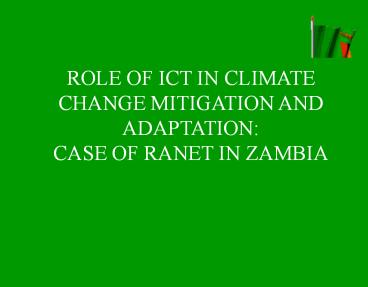ROLE OF ICT IN CLIMATE CHANGE MITIGATION AND ADAPTATION: - PowerPoint PPT Presentation
Title:
ROLE OF ICT IN CLIMATE CHANGE MITIGATION AND ADAPTATION:
Description:
... The broadcast is then received by digital radios that are ... therefore we encourage local ownership and use of latest communication systems for multiple ... – PowerPoint PPT presentation
Number of Views:450
Avg rating:3.0/5.0
Title: ROLE OF ICT IN CLIMATE CHANGE MITIGATION AND ADAPTATION:
1
ROLE OF ICT IN CLIMATE CHANGE MITIGATION AND
ADAPTATION CASE OF RANET IN ZAMBIA
2
RANET BACK GROUND
The RANET program began in Africa in 1998/9,
following the experience of Seasonal Climate
Outlook Forums. It was recognized that benefits
from advances in ICT science and applications
could only be realized if populations outside
central cities could be reached.
- Africa 1998/99/00 -gt present
- Pacific 2003 -gt present
- Asia 2005
3
THE AIM OF THE PROJECT
The overall project goal is to respond to
the challenge of exchanging vital
information with the rural communities of Zambia
by introducing new information technologies
through the use of the WorldSpace
Foundations Digital Satellite Radio
Broadcasts, and solar/windup radios.
4
WHAT IS RANET?
The word RANET is an acronym from the words
Radio and Internet
5
PROJECT OBJECTIVES The overall objective is to
enhance the living standards of rural
communities by way of increasing their access to
vital information on agriculture,
education, health, environment, weather, natural
calamities and other vital developmental informat
ion needed in order to improve their well-being
and widen their food security base.
6
WHY COMMUNITY RADIO? The greatest limitations to
the use of information are inaccessibility,
timeliness, poor reliability and language of
communication. Currently there facilities in
Zambia for the dissemination of information to
the people, however, these facilities are only
accessible within the urban and peri-urban areas
and not in remote rural areas.
7
TARGET GROUPS
The RANET broadcasting project is intended to
reach rural communities in isolated areas. It
is these areas that are poor and have less/no
access to information. In these Areas
Communities are required to involve Women and
the youth in the project..
8
WHY RANET COMMUNITY RADIO? RANET and its
partners possess a unique ability in content
production, dissemination as well as having a
local presence and the use of the local
language.
9
FIRST VOICE and RANET Uplink
content to satellite
RANET And partners Generate content
for dissemination
10
- IMPLEMENTATION STRATEGY
- The Implementation Team
- The inaugural workshop of September
- 2000 put in place the Implementation
- Team to spearhead the implementation
- Of the project.
11
THE IMPLEMENTATION TEAM Composition NAIS, PAM
, DUNAVANT, EBS, AFRICARE, ZMD, CDSW,
PANOS, ZMCOM, WVI, NMF, PALESA, CHAZ,WFP
12
- PROJECT ACTIVITIES
- Sensitise Communities, form
- Management Teams for stations,
- Registeration under the Societies Act
- Business Names Act
- Facilitate acquisition and installation of
equipment - Facilitate training for the Management Teams and
Staff
13
Activities continued
- Provide
- timely agricultural and marketing information.
- Timely weather and climate information to rural
communities. - Timely warnings about impending natural
disasters. - Forum for discussion of local issues so that it
would lead to the solution of problems
14
Activities continued -
- Monitoring and providing impact assessment on
various natural disasters. - Encouraging creativity as a way of promoting
self-reliance and development. - Support for the health and education of the
communities.
15
Stations established by RANET are in red and
partners in orange colour
16
IMPACT ASSESSMENT
- A baseline survey conducted in 14
- broadcasting areas by NAIS/JICA in
- 2006 revealed that, among other things
- Radio if used Effectively Can contribute
- to increased knowledge, skills, technologies
- and reaches areas not reached by
- extension agents.
- 2. One does not need to be literate to
- listen to the radio.
17
- Equipment Distributed to Date -
- Wantok SBS-1 FM Broadcastingstations 4 and 1x
500wt Transmitter - Solar/windup Radio receivers 3154
- Mobile Phones 20
- WorldSpace Digital Satellite
- Receivers 43
- Personal Computers 1
- Chatty Beetle Satellite system 2
18
Core philosophies?
Ensuring sustainability and maintenance of
systems is a priority of all RANET activities,
therefore we encourage local ownership and use of
latest communication systems for multiple
purposes such as education, health campaigns,
community discussions, etc.































